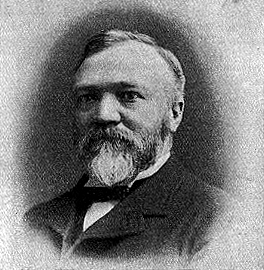The Homestead and Pullman Strikes
by Spence Holman, Vassar '99
In light of the recent depression, the voters of 1896 were concerned with keeping money in their pockets. Bimetallism was touted as the solution as well as the cause of the nation's economic difficulties. William Jennings Bryan spoke to this in his famous speech, asking that "you shall not press down upon the brow of labor this crown of thorns."
The voice of the worker was strong, and each party was interested in gaining its favor. At the same time, there was fear of unrest. Within recent public memory lay two major events that led to this unease--the Homestead strike of 1892 and the Pullman Railroad strike of 1894. These two conflicts brought to the surface the deeper issues at work in an age of industrial progress.
In a song about Homestead entitled "A Man Named Carnegie," workers at the Pennsylvania plant are referred to as chattel and slaves. At Pullman, a worker reportedly told the Chicago Herald that "the only difference between slavery at Pullman and what it was down South before the war is that there the owners took care of their slaves when they were sick and here they don't." The feeling among workers was that slavery had not ended, but had just changed. Workers labored for long hours under poor conditions, and were subject to the whims of their employers.
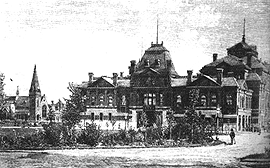
Image of the town of Pullman from Richard Ely's "Pullman: A Social Study," Harper's New Monthly Magazine, February 1885
At the Pullman factory, employees lived in the company town, much like slaves lived on the plantations where they worked. Pullman residents lived in constant fear of their employer, worried that if they voiced any disparaging opinions about the town (an example of a modern utopia, according to many newspapers of the day), they would be reprimanded or, even worse, fired. Anonymity was the best escape. The less seen and less heard one was, the less likely one was to get in trouble.
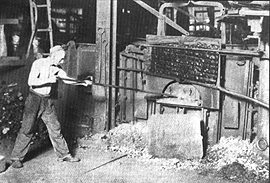
An Iron Puddler
Workers were dehumanized by the emerging corporate complexes. The Pullman town, which was meant to solve the labor problem, ended up exacerbating existing tensions. Residents felt that the company had taken over every aspect of their life, and had taken their identity in the process. Unions gave a voice to those without, and strikes became a way to assert an identity. Individuality was equated with wealth. Thus, when wages were cut, employees felt as if they were being de-emphasized even further.
The employers, of course, did not take the same stance. George Pullman felt that he was improving the lives of his workers by providing them with housing, shopping, and entertainment next to their workplace. Carnegie provided money for civic buildings such as libraries as he cut wages. It was a bread-and-circus approach to a more complex problem. Food and entertainment wasn't the only thing workers wanted or needed; they were searching for an identity beyond that of an hourly wage earner. The strikers not only wanted more money for their homes and families, they desired independence.
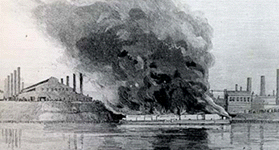
Carnegie Steel Works during the 'Battle of Homestead,' July 1892, from the Rivers of Steel Heritage Area, Pittsburgh
"About the only difference between slavery at Pullman and what it was down South before the war, is that there the owners took care of the slaves when they were sick and here they don't."
-- worker to a reporter for the Chicago Herald, 31 May 1890
"[Pullman] is, in fact, philanthropy made practical; humanity, founded on business principles; sobriety, art music, clean living, refined homes, self-respecting independence of character without paternalism; a vindication of the theory that there is an economical value in beauty, and that the workingman is capable of appreciating and wisely using the highest ministries of art and beauty."
--Chicago Times, 10 January 1891
Sing ho, for we know you, Carnegie;
God help us and save us, we know you too well;
You're crushing our wives and you're starving our babies;
In our homes you have driven the shadow of hell.
Then bow, bow down to Carnegie,
Ye men who are slaves to his veriest whim;
If he lowers your wages cheer, vassals, then cheer. Ye
Are nothing but chattels and slaves under him.
- 2nd verse, "A Man Named Carnegie," anonymous, California, 7 July 1892
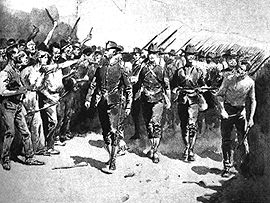
--Frederic Remington, sketch of the Homestead strike, from Frank Leslie's Illustrated Weekly, 14 July 1892. Remington depicted strikers as dangerous rioters, opposing the forces of order and good government.
"At 12 o'clock last night every department of the immense Carnegie steel works at Homestead was shut down, throwing about 3,800 men out of employment...It has been the custom of the Carnegies, and all other mills, to discharge their men on the night of the expiration of the yearly contract. The men had declared positively that they would strike at the date of the expiration of the yearly contract. This term of expiration was to occur either at 6 o'clock this morning, or at 6 o'clock this evening, just as the authorities decided. At midnight, the firm cleverly forestalled the men, and flatly declared a shut-down. Instead of being a strike then at the great steel works, the action of the firm has made it a lock-out."
-- The Pittsburgh Post, 30 June 1892
"Governor Pattison, being convinced that Sheriff McCleary is unable to restore order at Homestead, has ordered out the entire National Guard -8,500 men-all the available military force of the state, to Homestead for service. It is understood that the Governor's purpose in calling out the entire National Guard is to make sure that there will be no demonstration on the part of the locked-out men. He thinks that men will quietly submit before such an overwhelming force, while they might resist if one regiment was sent there."
--New York Herald, 11 July 1892
SOURCES
Demarest, David P., ed. "The River Ran Red": Homestead 1892. Pittsburgh, University of Pittsburgh Press, 1992.
Montgomery, David. The Fall of the House of Labor: The Workplace, the State, and American Labor Activism, 1865-1925. New York: Cambridge University Press, 1987.
Smith, Carl. Urban Disorder and the Shape of Belief. Chicago: University of Chicago Press, 1995.

